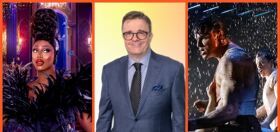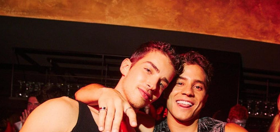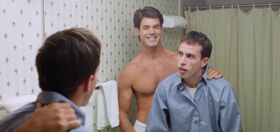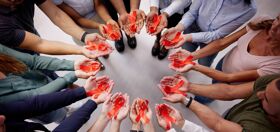 “It can be a really oppressive environment,” openly gay singer Nakhane Touré says of his native South Africa. “In some instances it can get life-threatening.”
“It can be a really oppressive environment,” openly gay singer Nakhane Touré says of his native South Africa. “In some instances it can get life-threatening.”
Yet despite extreme societal pressures to remain closeted, 26-year-old Touré has chosen to be open about his sexuality. In fact, he’s written and recorded an entire album about it.
“My work is an extension of who I am,” he says. “No censorship allowed.”
Toure’s debut album, Brave Confusion, couldn’t be more appropriately titled. Here is a black Christian male singing love songs about other men in an environment that hasn’t exactly been welcoming towards gay people. The album is an eclectic hybrid of genres and sounds that work surprisingly well together. Think Frank Ocean meets Radiohead meets Antony and the Johnsons with a little Prince and David Bowie thrown in for good measure.
How about we take this to the next level?
Our newsletter is like a refreshing cocktail (or mocktail) of LGBTQ+ entertainment and pop culture, served up with a side of eye-candy.
The subject matter is equally as diverse. Touré sings about everything from love to self-loathing to death to self-acceptance. As one reviewer put it, Brave Confusion is “rife with complexities, swathed in a disarming honesty that holds you captive right through his tortured journey to clarity.” The album received four South African Music Awards in 2013, including nominations for Album Of The Year, Best Alternative Album, Newcomer Of The Year, and Male Artist Of The Year.
We had an opportunity to interview the singer via e-mail about the album, his new homoerotic music video — which is causing quite a stir in his homeland — and his experience as an openly gay artist in South Africa.
The album was originally released last summer, but a new Deluxe Edition is coming out on iTunes April 7. What has the response been so far?
When we released the album last year I was so cocooned from the “industry” that I didn’t really think about what the response for the album would be. I was more excited about the idea of actually having an album released than what people might think about it. When the reviews finally started streaming in, they were overwhelmingly positive.
For people who don’t know, what is your background?
Well, I was born in a small town in the Eastern Cape called Alice, a glorified village really. When I was seven I moved to Port Elizabeth, and now I have been living in Johannesburg for about 10 years. My maternal side of the family is very musical, so I grew up in an environment of singers and choirs. When I was in primary school I studied the trombone classically, while playing other instruments like the piano, steel drums, drums, marimbas, and then later the guitar.
 What is the attitude towards gay people in the Eastern Cape?
What is the attitude towards gay people in the Eastern Cape?
I think I have to preface this answer with the fact that my family is part of the chiefdom in the Eastern Cape, so my uncle is the chief now. Traditional masculinity and sexuality is not only expected but preached incessantly. But on the other hand my family has always been open to different ideas. Even if they don’t agree with me I’ve always been given a place to voice my opinion. My uncle and I have had many discussions about sexuality, gender and the “role” of a man that have been hilariously heated. That’s my family. Other families may not be as open-minded. It can be a really oppressive environment, which is why I think many LGBT people in the Eastern Cape have remained closeted. In some instances it can get life-threatening.
How did your family respond when you told them you were gay?
I guess in the typical fashion: tears, phone calls from aunts and uncles, supportive cousins and friends in the same generation, slight mental breakdown from me. But then over time they thawed. You know, it’s easy to throw stones when the person is so far away, but when it’s personal, when it’s your own child, you look at things differently and you realize that maybe some things that you believed about a certain group of people are not necessarily true. At least that’s what my mother says to me now. All is well now.
How do you think being gay influences your art?
My work is an extension of who I am. No censorship allowed. So basically that means my entire being, whether it’s flattering or not — and most of the time it is not — is put into my work. My sexuality is a facet of who I am, so naturally it plays a part.

Your new music video “In the Dark Room” was shot in a prison cell in Constitution Hill, which used to be a prison in Johannesburg.
We initially wanted a derelict lived-in space. Constitution Hill was a very oppressive, cruel place to be in. The video deals with some form of mental imprisonment, a self-hate so drastic, so ugly that it turns violent within you. And while we shot the video I couldn’t help but see the parallels between the location and what we were going for.
Mental imprisonment and self-hatred. Is that what the song is about as well? More specifically, the hatred some gay people feel towards themselves?
Yes, completely. The song is about a searing self-hate, which took on many different guises over the years before the album was released. It’s a very difficult song for me, even though I see it as a groovy pop song, sometimes when I play it live I catch myself falling and I have to re-balance myself.
To contrast that, the album’s opener “Christopher“ is much more upbeat.
I wrote the song after the final demos of the album were finished and recorded, and I was listening to a lot of Dirty Mind-era Prince and Busi Mhlongo.
 And Christopher was a guy you were chatting with online.
And Christopher was a guy you were chatting with online.
I had not met him [in person] yet. I was supposed to meet him at some bar, but for some reason that did not happen. I was exercising song-writing, trying to see if I could write a catchy “pop” song in the vein of Prince and when I was stuck on the second verse I thought I’d write about this Christopher as a place-holder until I figured out the proper lyrics. At that point I didn’t think that the song would even be in the album. Little did I know that it would be the first single. After the single was released I finally met Chris and now we’ve been dating for about 11 months. I call it a stalker anthem.
How does he feel about being the subject of your first single?
In the beginning he was slightly embarrassed when people realized that the song was about him, but now he’s very pleased about it. And sometimes when I play the song live I change some of the lyrics just to throw him off a little. Although I try not to look at him when I play the song live.
Is there anything you would like to add?
Thank you for recognizing a South African artist. There are many different musicians and artists in this country who don’t have the confidence to come out. I know for a fact that I’m not the only one. Hopefully with this support, more will find the courage to come out.























PRINCE OF SNARKNESS aka DIVKID
..meets David McAlmont